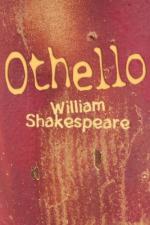|
This section contains 641 words (approx. 3 pages at 300 words per page) |

|
Analysis of a Passage in "Othello"
Brabantio is startled in the night when he finds out that his beloved daughter, Desdemona is married with Othello, the Moor. Brabantio portrays three different moods in this passage. He mainly is angry at first. "O thou foul thief." With this quote a reader can realize that Brabantio is trash talking Othello and simply calling him a horrible thief. He is enraged that someone would just steal his daughter. Certain words that Shakespeare uses also show this anger. "Damn'd as thou art, thou has enchanted her." Through the use of diction I can tell that Brabantio is very confused and most of all angry. The word "enchanted" means to be under a spell or to be mesmerized by somebody. This word shows that Brabantio thinks Othello has...
|
This section contains 641 words (approx. 3 pages at 300 words per page) |

|


